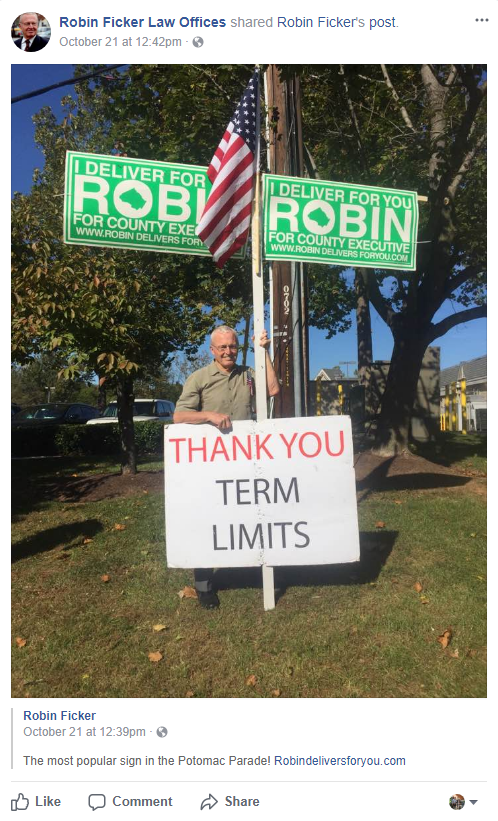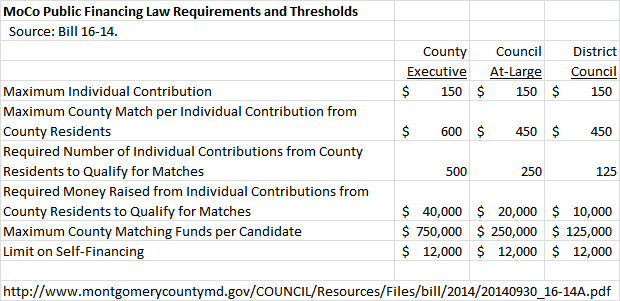By Adam Pagnucco.
The May campaign finance reports are in and we will start breaking them down with the County Executive race. A note on methodology. First, we calculate total raised and total spent across the entire cycle and not just over the course of one report period. Second, we separate self-funding from funds raised from others. Self-funding includes money from spouses. Third, for publicly financed candidates, we include public matching fund distributions that have been requested but not deposited in raised money and in the column entitled “Cash Balance With Requested Public Contributions.” That gives you a better idea of the true financial position of publicly financed campaigns.
Below is our fundraising summary for the County Executive candidates.
Council Member Roger Berliner (whom your author supports) is the leader in money raised other than self-funding and also in cash on hand. He is closing in on a million dollars raised for the race, which was roughly Ike Leggett’s total in 2006. He has enough money to be heard in the final month.
Council Member Marc Elrich is the leader among the publicly financed candidates. His total raised of $745,352 is almost five times what he raised in his 2014 council race when public financing was not yet available. Elrich has a long history of vastly outperforming his fundraising because of his large and loyal base of supporters, some of whom have been with him for decades. With more than $400,000 to spend in the final month, he won’t blow anyone out, but he can combine that with a grass-roots field program to finish strong.
Businessman David Blair is going to break Steve Silverman’s fundraising record in 2006 with more than $2 million. The difference is that Silverman raised his money from the business community while Blair is mostly a self-funder. Blair’s self-financing of $1.9 million sends a message that he is deadly serious about winning. He is the strongest of the outsider candidates.
Council Member George Leventhal will get votes because of his longevity, name recognition and sheer hard work in the campaign cycle. (His brilliant Avengers-themed video could get some votes too!) But he doesn’t have enough resources to make a big push at the end.
Former Mayor of Rockville Rose Krasnow is a substantive and knowledgeable candidate who impresses those she meets. But she made two big mistakes in this campaign: getting in late and using public financing. Those mistakes reinforce each other. If she had gotten in early, she might have been able to raise enough in public financing to compete with the totals accumulated by Elrich and Leventhal. Since she did get in late, traditional financing offered a better option to raise money in a hurry. Now she is in the same situation as Leventhal and Bill Frick: struggling to make a final push.
Your author likes Delegate Bill Frick (D-16) a lot personally but he doesn’t have the resources to make his case. We wish Frick had stayed in the House of Delegates and plotted a course to succeed his former district mate, Brian Frosh, as Attorney General. The path not taken will be harder now.
Republican Robin Ficker has applied for public financing, but as of this writing, we don’t know whether he will receive it.
Overall, there are two competing narratives among those who are really focused on this race – admittedly, a minority of the voters. First, there is the view that the county should be more progressive. It should be bolder about closing the achievement gap, do more to help vulnerable residents (including renters), institute tougher environmental protections and push back against the influence of developers and big businesses. People with that perspective are mostly rallying behind Elrich, who is the overwhelming choice of progressive endorsing organizations.
Then there is the narrative advanced by your author’s writings on the county budget and the economy, the Washington Post’s endorsement editorials and the now-famous report by Sage Policy Group: to pay for progressive priorities, the county needs a stronger tax base. That message plays more to the outsider candidates, especially Blair, who put it in a recent mailer. But there’s no reason why Berliner and Leventhal shouldn’t embrace that perspective too.
It’s important to recognize that these views are not mutually exclusive. Not all progressives are skeptical of economic growth. And not all people who would like to see a stronger economy oppose spending the resulting revenue on progressive priorities. But the two messages contain differences in emphasis and differences in potential for attracting blocs of voters. Both of them represent change in some form, implying that running on resume and experience won’t be enough in this cycle – at least not in the Executive contest. Everyone needs to pick a path forward to win.
Next: the Council At-Large race.








